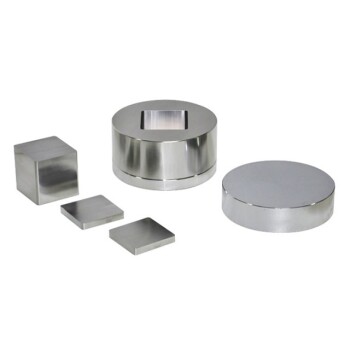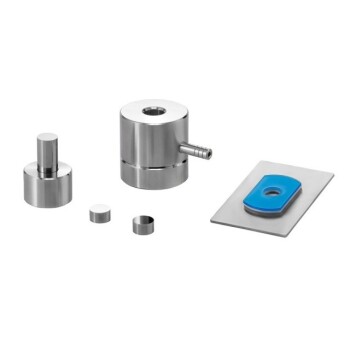At its core, a laboratory press is used for three primary functions: preparing samples for spectroscopic analysis, testing the physical properties of materials, and forming or molding compounds into specific shapes. These applications span industries from materials science and chemistry to pharmaceuticals and forensics, making the press a versatile cornerstone of the modern lab.
A laboratory press is not simply a device for crushing materials. It is a precision instrument designed to apply controlled force, and often heat, to transform a substance into a state that is ideal for analysis, testing, or further research and development.

The Core Function: Sample Preparation for Analysis
The most frequent use of a laboratory press is to convert raw or powdered materials into a uniform, measurable format required by analytical instruments.
Preparing Samples for Spectroscopy (FTIR & XRF)
Many analytical techniques require a sample to be homogenous and have a consistent path length for the instrument's beam to pass through.
A press is used to create KBr (potassium bromide) pellets for Fourier Transform Infrared (FTIR) spectroscopy. A small amount of the organic sample is mixed with KBr powder and pressed into a thin, transparent pellet, allowing the infrared beam to pass through for analysis.
For X-ray Fluorescence (XRF) spectroscopy, powdered samples are pressed into dense briquettes or pellets. This creates a flat, homogenous surface with consistent density, ensuring accurate and repeatable elemental analysis.
Creating Thin Films for Transmission
For polymers and plastics, a hot press with heated platens is used to melt the material and press it into a thin film of uniform thickness.
This film is then analyzed, often using IR spectroscopy in transmission mode, to understand its chemical structure and composition.
A Crucial Tool in Materials Science
Beyond sample prep, lab presses are fundamental to researching and developing new materials by testing their physical limits and forming them into useful shapes.
Testing Material Strength and Durability
In materials science, a press is used to subject a sample to high pressure to measure its deformation, stress-strain behavior, and failure points.
This form of destructive testing is critical for understanding and characterizing the strength, durability, and resilience of materials like ceramics, composites, and alloys.
Molding and Forming Compounds
Lab presses are used to mold rubbers, polymers, and thermoplastic resins into specific shapes for testing or creating prototypes.
This can also involve pressure-forming bricks or crushing materials to test their compressive strength, which is vital in civil engineering and geology.
Simulating Manufacturing Processes
A lab press can simulate larger industrial processes at a small scale. It is invaluable for short production runs, lean manufacturing R&D, and validating a process before scaling up.
Understanding the Trade-offs and Key Specifications
Choosing the right press involves balancing capability with the specific requirements of your application.
Manual vs. Automated Control
Manual presses are cost-effective and provide direct tactile feedback, making them ideal for creating one-off spectroscopic pellets (like KBr) where precision is user-controlled.
Automated or powered presses offer superior repeatability and higher throughput, which is essential for materials testing protocols or small production runs where the exact force and timing must be consistent for every sample.
The Role of Heated Platens
Many applications, such as preparing KBr pellets or basic briquetting, can be done at room temperature with a cold press.
However, working with polymers, composites, or certain curing processes requires a hot press. Heated platens allow for precise temperature control to melt, cure, or laminate materials effectively.
Pressure, Size, and Footprint
The required force can range from just 2 tons for simple pellet making up to 40 tons or more for materials testing and forming dense composites.
Platen size (from 4 inches to over 8 inches) and overall footprint are also critical factors, especially in labs with constrained benchtop space.
Making the Right Choice for Your Application
Your goal determines the type of press you need. Focus on the core task to guide your decision.
- If your primary focus is routine spectroscopic analysis: A compact, manual benchtop press is typically sufficient and cost-effective for creating KBr or XRF pellets.
- If your primary focus is materials testing and R&D: You will need a higher-tonnage automated press for repeatable force application, possibly with data logging capabilities.
- If your primary focus is polymer or composite molding: A press with heated platens is essential for controlling temperature during curing, forming, and laminating.
- If your primary focus is education or general-purpose use: A versatile, mid-range manual press offers the best balance of capability for demonstrating multiple applications.
Ultimately, the laboratory press serves as a fundamental bridge between a raw material and the actionable data derived from it.
Summary Table:
| Application | Key Uses | Ideal Press Type |
|---|---|---|
| Sample Preparation | KBr pellets for FTIR, briquettes for XRF | Manual or automated benchtop press |
| Materials Testing | Stress-strain analysis, durability tests | High-tonnage automated press |
| Molding and Forming | Polymer films, composite shapes | Hot press with heated platens |
| General Purpose | Education, prototyping | Versatile manual press |
Ready to enhance your lab's efficiency with the right press? KINTEK specializes in lab press machines, including automatic lab presses, isostatic presses, and heated lab presses, tailored for applications like spectroscopy, materials testing, and molding. Whether you're in materials science, pharmaceuticals, or forensics, our precision instruments deliver reliable performance and superior results. Contact us today to discuss your needs and discover how we can support your research and development goals!
Visual Guide

Related Products
- Automatic Laboratory Hydraulic Press Lab Pellet Press Machine
- Automatic Laboratory Hydraulic Press for XRF and KBR Pellet Pressing
- Laboratory Hydraulic Split Electric Lab Pellet Press
- Manual Laboratory Hydraulic Press Lab Pellet Press
- Laboratory Hydraulic Press Lab Pellet Press Machine for Glove Box
People Also Ask
- What feature of the hydraulic portable press helps monitor the pellet-making process? Discover the Key to Precise Sample Preparation
- How do hydraulic press machines ensure precision and consistency in pressure application? Achieve Reliable Force Control for Your Lab
- What are the key steps for making good KBr pellets? Master Precision for Flawless FTIR Analysis
- How do hydraulic pellet presses contribute to material testing and research? Unlock Precision in Sample Prep and Simulation
- What are the limitations of hand-operated presses? Avoid Sample Compromise in Your Lab



















